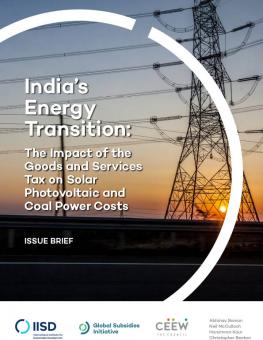
India's Energy Transition: The Impact of the Goods and Services Tax on Solar Photovoltaic and Coal Power Costs
One of the biggest changes in India's energy subsidy policy in FY18 was the introduction of the Goods and Services Tax (GST). How did this affect subsidies and costs for coal power and solar PV?
Key Messages
- The Goods and Services Tax (GST) has increased the cost of solar photovoltaic (PV) power generation by almost 6 per cent and reduced the cost of coal thermal power generation by 1.6 per cent.
- The absolute size of the subsidy to coal power generation remains INR 7,685 crore (USD 1.1 billion) higher than for solar PV in 2018.
- It is important for policy-makers to evaluate the impacts of such tax reforms to make sure they do not send the wrong price signals on energy choices.
In India’s Energy Transition 2018 Update, the Global Subsidies Initiative (GSI) of the International Institute for Sustainable Development (IISD) and the Council on Energy, Environment and Water (CEEW) published updated estimates of the scale of energy subsidies in India for FY2017, including partial data on the scale of subsidies for FY2018.
One of the biggest causes of changes in India’s energy subsidy policy between FY2017 and FY2018 was the introduction of the Goods and Services Tax (GST)—which overhauled a large share of India’s taxes, and, in doing so, its tax-related subsidies.
By removing exemptions and altering tax rates, the extent of preferential treatment for various energy sources has changed under the GST. Total tax subsidies to both solar PV and coal thermal power have been reduced, but the absolute size of the subsidy to coal-based power remains much higher than for solar PV.
By altering the net tax burden, the GST has also affected the cost of energy production. Our calculations show that, assuming all other factors are held constant, the GST is likely to lead to a significant increase in the cost of generation for new solar PV plants. In contrast, existing coal-fired thermal power plants are likely to experience reduced variable costs under the GST. A lack of data on the fixed costs of new coal plants makes it impossible to calculate the impact of the GST on the overall cost of new coal plants.
The introduction of the GST therefore appears to provide a relative bias in favour of coal-based power.
Detailed assessments of the implications of GST on other renewable energy types including wind are needed to determine unintended impact on relative cost against coal.
Participating experts
You might also be interested in
Increased Support Needed to Achieve India's Clean Energy Goals
India is on track to achieve many of its 2030 clean energy goals but needs to step up government support measures to accelerate the deployment of offshore wind, electric vehicles, and green hydrogen, according to a new report.
India Faces Clean Energy Challenges as Energy Demand Soars and Global Fossil Fuel Subsidies Rise
New research finds the global energy crisis and increasing energy demand have pushed India's energy subsidies to a 9-year high.
G20 energy ministers call for cooperation on nuclear energy & low-emission hydrogen
The Group of 20 energy ministers' meeting concluded in Goa on July 22, 2023, with the final summary failing to include language on the phase-down of unabated fossil fuels.
Implementing Solar Irrigation Sustainably
This guidebook provides recommendations to state policy-makers on how they can implement solar irrigation models, particularly decentralized solar plants for irrigation under the PM-KUSUM scheme, effectively and sustainably.